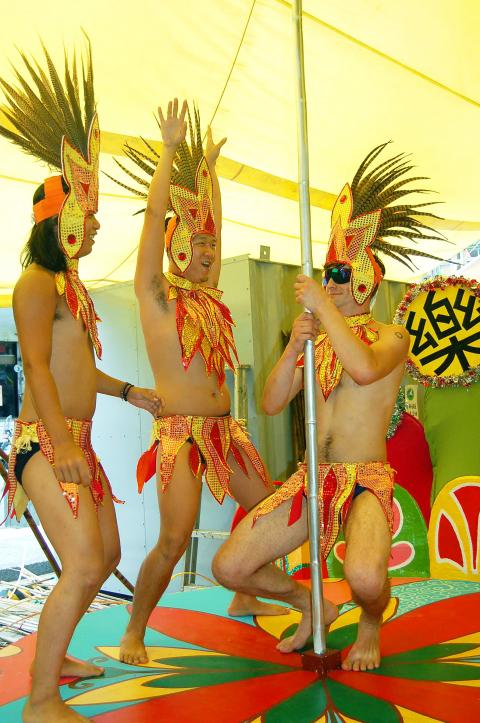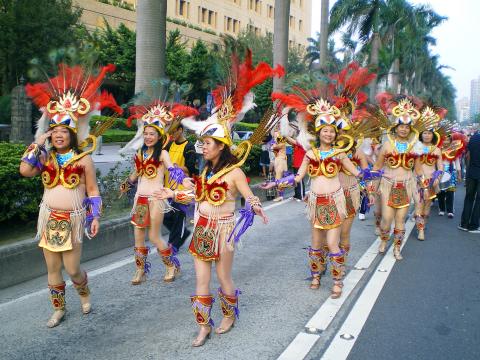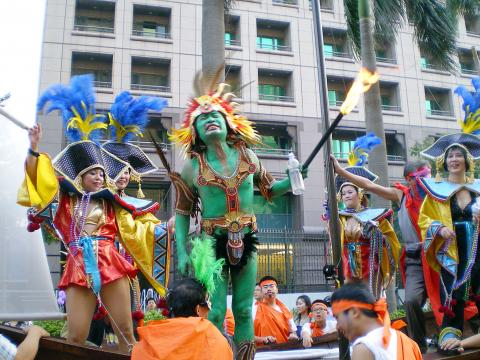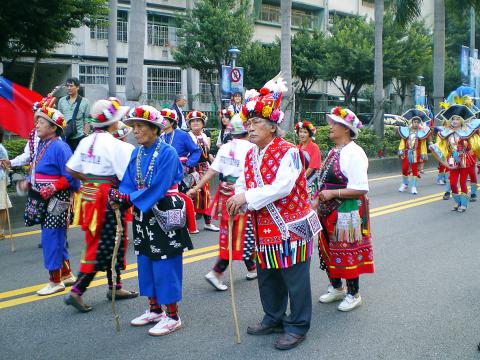UPDATE: While Gordon Tsai (蔡聰明) was confident on Thursday that the Dream Community’s (夢想社區) annual Dream Parade would go ahead on Saturday, Mother Nature had other ideas. While the skies turned out to be clear in Taipei on Saturday, the rain and winds brought by Typhoon Megi had taken their toll on roads along the east coast on Friday, and Tsai said about 70 percent of the groups scheduled to be in the parade notified him that they wouldn’t be able to get to Taipei.
"Especially those groups from Taitung and from Pingtung County, they couldn’t make it, so we decided to cancel the parade,” Tsai said yesterday. “We are trying to reschedule, maybe for two or three weeks from now.”

Photo: Taipei Times
In early fall, the sounds of drumming and hammers fill the air around the Dream Community (夢想社區) in Sijhih (汐止), Taipei County, as preparations hit full stride for the annual Dream Parade — an attempt to bring a little bit of Mardi Gras, a little bit of Brazilian carnival and a whole lot of craziness to Taipei.
The annual parades are certainly a celebration — of homemade creativity, of family fun, of stepping outside your normal, everyday life, whether you are a school kid, university student, office worker or parent. The costumes and floats can run from simple outfits made in just a few hours (or less) to elaborate papier-mache and bamboo creations that take weeks to prepare.

PHOTOS: Diane Baker, Taipei Times
Since the beginning of the month, workshops have been held at the Neihu Community College, the Jane Goodall Institute and at the Dream Community for those interested in helping create costumes or floats. Hundreds of people will also be coming from around the country, many of whom have been practicing or taking part in local parades or competitions in order to be in Taipei for tomorrow’s parade.
Gordon Tsai (蔡聰明), the driving force behind the community, said this year’s parade will be different from earlier ones because it doesn’t really have a theme; it’s just a “celebration of life.”
There will also be a lot of Hakka floats and participants because Tsai and his crew launched an outreach program this year, trying to develop connections with various Hakka communities.

PHOTOS: Diane Baker, Taipei Times
“The Hakka are very conservative, they are always so hardworking, so we wanted to make connections to get them involved, to help them enjoy themselves,” he said.
There will also be an Aboriginal dance competition, kind of — Aboriginal, with some samba spiciness thrown in. A few years ago Tsai started sending Brazilian drumming instructors, who were in Taipei to live and teach in the Dream Community for a few months, to Aboriginal communities around the country to teach samba drumming and help organize drumming bands.
This year, Tsai said, there will be 30 Aboriginal teams from around the country — dancers, drummers and singers — who competed locally for a chance to be in the parade and the 2010 National Dream Cup Competition, which will be held afterwards.

PHOTOS: Diane Baker, Taipei Times
“You know, the different Aboriginal tribes used to fight each other before, so now they are fighting again, but with drums,” Tsai said.
Of course, one of the most eye-catching participants every year is Tsai himself, who runs up and down the parade route encouraging the marchers and their audience — when he’s not breathing fire — while clad in little more than body paint, G-string and headdress.
When asked for a hint about his costume this year, Tsai was uncharacteristically reticent, except to say that it might involve pink paint and it would certainly involve fire.
“Fire is my symbol, my mark,” he said.
The parade route is 1.2km long, beginning at the Chiang Kai-shek Memorial Hall, where participants will assemble in the plaza. They will head up Zhongshan South Road (中山南路) to Renai Road (仁愛路), where the parade will turn right and head toward Linsen South Road (林森南路) before making a U-turn and heading back to Ketagalan Boulevard (凱達格蘭大道) and a staging area in front of the Ministry of Foreign Affairs.
The parade starts at 3pm and is scheduled to finish sometime between 5:30pm and 6pm. The post-parade show and party is scheduled to run from 6pm to 8pm.
If you want to try and collect some of the beads thrown from the floats Mardi Gras style, the best spot is probably at the beginning of the parade route just as the floats are leaving the Chiang Kai-shek Memorial Hall area.
A last-minute call to Tsai before press time confirmed the parade was still planned for tomorrow, with organizers hoping that rains brought by Typhoon Megi will have diminished by then.

June 2 to June 8 Taiwan’s woodcutters believe that if they see even one speck of red in their cooked rice, no matter how small, an accident is going to happen. Peng Chin-tian (彭錦田) swears that this has proven to be true at every stop during his decades-long career in the logging industry. Along with mining, timber harvesting was once considered the most dangerous profession in Taiwan. Not only were mishaps common during all stages of processing, it was difficult to transport the injured to get medical treatment. Many died during the arduous journey. Peng recounts some of his accidents in

“Why does Taiwan identity decline?”a group of researchers lead by University of Nevada political scientist Austin Wang (王宏恩) asked in a recent paper. After all, it is not difficult to explain the rise in Taiwanese identity after the early 1990s. But no model predicted its decline during the 2016-2018 period, they say. After testing various alternative explanations, Wang et al argue that the fall-off in Taiwanese identity during that period is related to voter hedging based on the performance of the Democratic Progressive Party (DPP). Since the DPP is perceived as the guardian of Taiwan identity, when it performs well,

The Taiwan People’s Party (TPP) on May 18 held a rally in Taichung to mark the anniversary of President William Lai’s (賴清德) inauguration on May 20. The title of the rally could be loosely translated to “May 18 recall fraudulent goods” (518退貨ㄌㄨㄚˋ!). Unlike in English, where the terms are the same, “recall” (退貨) in this context refers to product recalls due to damaged, defective or fraudulent merchandise, not the political recalls (罷免) currently dominating the headlines. I attended the rally to determine if the impression was correct that the TPP under party Chairman Huang Kuo-Chang (黃國昌) had little of a

At Computex 2025, Nvidia CEO Jensen Huang (黃仁勳) urged the government to subsidize AI. “All schools in Taiwan must integrate AI into their curricula,” he declared. A few months earlier, he said, “If I were a student today, I’d immediately start using tools like ChatGPT, Gemini Pro and Grok to learn, write and accelerate my thinking.” Huang sees the AI-bullet train leaving the station. And as one of its drivers, he’s worried about youth not getting on board — bad for their careers, and bad for his workforce. As a semiconductor supply-chain powerhouse and AI hub wannabe, Taiwan is seeing